 Your new post is loading...
 Your new post is loading...

|
Scooped by
Gust MEES
|

|
Scooped by
Gust MEES
|
Working in learning technology, or education technology ("edtech"), is changing as our understanding of technology develops. We have become more aware not only of the potential of technological innovation but also of what is needed to scale up this innovation from use in small-scale pilots or single classrooms to applications for all learners. Scaling up requires not only infrastructure and technical capabilities but also skilled staff and robust policies. Most importantly, we need to keep questioning whether learning technology really delivers benefits for all students. We know that technology has huge potential, but we now have decades of research and practice to build on as we move our professional practice beyond advocacy and toward a more reflective, more critical perspective—a perspective that, I hope, will empower us to tackle some of the complex questions around ethics, inclusion, equality, and privacy.
In this article, I wish to combine both a personal perspective and one informed by my professional position. I wish to share my personal views in order to get across why I think it is so important that we develop a more mature, more reflective, more critical perspective in our professional practice and how we might set about doing so in the age of automation and technological determinism. My outlook is also informed by the research, practice, and policy making led by the Association for Learning Technology (ALT) in its twenty-five years of work with thousands of professionals in the United Kingdom and across the globe. Learn more / En savoir plus / Mehr erfahren: https://www.scoop.it/t/21st-century-learning-and-teaching/?&tag=Grit https://www.scoop.it/t/21st-century-learning-and-teaching/?&tag=Growth+Mindset https://gustmees.wordpress.com/2015/05/13/andragogy-adult-teaching-how-to-teach-ict/ https://gustmees.wordpress.com/2017/08/25/adventures-of-learning-how-does-it-happen/ https://gustmees.wordpress.com/?s=life+long+learning

|
Scooped by
Gust MEES
|

|
Scooped by
Gust MEES
|
Si avant 2013, l’EPE était considérée comme un élément du secteur social et de la santé et le programme pour la petite enfance ne constituait qu’une simple recommandation, ce nouveau programme est désormais obligatoire dans tous les établissements d’EPE en Finlande.
Il s’agit « d’un jalon important en faveur de la mise sur pied d’un apprentissage tout au long de la vie et de l’égalité des chances dans l’enseignement en Finlande », a souligné Luukkainen.
L’OAJ est également très satisfait de ce document, car le syndicat a joué un rôle déterminant dans son élaboration. « Cela montre à quel point il est important que les syndicats d’enseignants et le ministère de l’Education se retrouvent autour de la même table afin d’élaborer ensemble toutes les lignes directrices concernant l’enseignement », souligne Luukkainen.
Luukkainen a en outre mis en avant que la Finlande possédait désormais « la suite parfaite d’apprentissage et de programmes » pour l’éducation de la petite enfance, de l’éducation préprimaire à l’enseignement primaire. Learn more / En savoir plus / Mehr erfahren: http://www.scoop.it/t/21st-century-learning-and-teaching/?&tag=Finland

|
Scooped by
Gust MEES
|
The profound changes ahead demand an education approach that lifts the proficiency of all students.
What might this take?
If future adults will need to reinvent themselves and constantly adapt to change, then education will need to focus even more on learning how to learn as well as what to learn.
A theme emerging from our investigations is that some of the key skills and attributes of the future are not necessarily the ones that we directly measure in our major assessments.
We are good at assessing literacy and numeracy skills and students' depth of content knowledge in core subjects. These will continue to be critical. But what of broader skills such as resilience, that idea of the growth mindset, the capacity to fail and try again, to persevere?
Do we know enough about the most effective teaching practices, the tools and resources schools need to nurture them and how best to assess their attainment? Learn more / En savoir plus / Mehr erfahren: https://gustmees.wordpress.com/2016/02/18/the-new-possibilities-to-learn-and-teach-with-ict/ https://gustmees.wordpress.com/2015/08/01/21st-century-education-is-learning-to-learn-for-life-long-learning-and-nothing-else-matters/

|
Scooped by
Gust MEES
|
The future of work is all about innovation and agility. We have to be prepared for ever-changing circumstances, and that means being open to learning new things.
Learning is no longer something we just do in schools. We can't rely on just the skillset we knew when we entered the workforce--that will guarantee career stagnation. NLI has recently been exploring how to make ideas stick. Through their research, they created a model outlining four key conditions for effective learning: Attention, Generation, Emotion and Spacing (AGES). Here's a quick overview of the AGES model: Attention: When you learn, maintain a single focus having complete and undivided attention. Generation: Listening isn't enough. Heighten the likelihood of memory retention by doing something with the information you're learning. Create a situation that will make this information meaningful. Emotion: Strong emotions lead to strong memories. Look for ways to build an emotional connection to what you're learning. Spacing: In order to grow memory, you need a break in between learning. Learn more / En savoir plus / Mehr erfahren: http://www.scoop.it/t/21st-century-learning-and-teaching/

|
Scooped by
Gust MEES
|
Progressive education | John DEWEY
Progressive education is a pedagogical movement that began in the late nineteenth century; it has persisted in various forms to the present. The term progressive was engaged to distinguish this education from the traditional Euro-American curricula of the 19th century, which was rooted in classical preparation for the university and strongly differentiated by social class. By contrast, progressive education finds its roots in present experience. Most progressive education programs have these qualities in common:[citation needed] - Emphasis on learning by doing – hands-on projects, expeditionary learning, experiential learning
- Integrated curriculum focused on thematic units
- Integration of entrepreneurship into education
- Strong emphasis on problem solving and critical thinking
- Group work and development of social skills
- Understanding and action as the goals of learning as opposed to rote knowledge
- Collaborative and cooperative learning projects
- Education for social responsibility and democracy
- Highly personalized learning accounting for each individual's personal goals
- Integration of community service and service learning projects into the daily curriculum
- Selection of subject content by looking forward to ask what skills will be needed in future society
- De-emphasis on textbooks in favor of varied learning resources
- Emphasis on lifelong learning and social skills
- Assessment by evaluation of child's projects and productions
Link from Wikipedia: https://en.wikipedia.org/wiki/Progressive_education#John_Dewey

|
Scooped by
Gust MEES
|
Many of us think that to be successful, you have to be at the right place, the right circumstance and the right age.
But we can learn from those who have come before us, who achieved at every age and in every circumstance of life.
Innovation is everyone's great desire. We worship innovation. Entrepreneurs embrace it. Careers are made on it. Companies compete over it. The challenge is we may not all be talking about the same thing.
The innovator's mindset embraces these ten strategies I have found in my research:
1. Bring value and meaning that is clearly unique.
2. Create a culture of inventing that others can build on.
3. Move with velocity to embrace the new.
4. Have the courage to create.
5. Disrupt yourself before others do.
6. If you don't have passion about an idea, don't do it.
7. Change something to make it better, bring the value.
8. Monetizing innovation is called success.
9. People do the innovating.
10. Decide what mountain top you want to own, then go for it.
Learn more:
https://gustmees.wordpress.com/2015/07/19/learning-path-for-professional-21st-century-learning-by-ict-practice/
Via Dan Kirsch

|
Scooped by
Gust MEES
|
Lifelong learning should play a role in Global Citizenship Education
‘Global citizens’ are more involved in their communities and are aware of the global ties of their actions. Lifelong learning can play a crucial role in Global Citizenship Education to raise awareness of global inequalities, to foster democratic change and to empower citizens worldwide.

|
Scooped by
Gust MEES
|
This informal learning workshop is for professionals who support organizational learning. After taking it, they will have a road map to implement some practical performance support and social learning strategies.

|
Scooped by
Gust MEES
|
|

|
Scooped by
Gust MEES
|

|
Scooped by
Gust MEES
|
New measures to boost key competences and digital skills, as well as the European dimension of education
Brussels, 17 January 2018
To follow up on the Gothenburg Summit, the European Commission has today adopted new initiatives to improve key competences and digital skills of European citizens, to promote common values and pupils' awareness of the functioning of the European Union.
The new proposals come only two months after European Heads of State and Government discussed education, training and culture at the Gothenburg Summit in November 2017. They are intended to reduce socio-economic inequalities, whilst sustaining competitiveness in order to build a more united, stronger and more democratic Europe. The three initiatives proposed by the Commission are: 1. A Council Recommendation on Key Competences for Lifelong Learning: Building on the Recommendation on Key Competences adopted in 2006, this proposal brings forward important updates reflecting the rapid evolution of teaching and learning since then. It aims to improve the development of key competences of people of all ages throughout their lives and to provide guidance to Member States on how to achieve this objective. A particular focus is placed on promoting entrepreneurial drive and innovation-oriented mindsets in order to unlock personal potential, creativity and self-initiative. Moreover, the Commission is recommending steps to foster competences in science, technology, engineering and mathematics (STEM) and motivate more young people to embark on a career in these fields. The proposals made today should also be seen as part of the answer to urgently improve European education systems to face the many challenges highlighted in the latest PISA survey. More generally, the measures will support Member States in better preparing learners for changing labour markets and for active citizenship in more diverse, mobile, digital and global societies. 2. A Digital Education Action Plan that outlines how the EU can help people, educational institutions and education systems better adapt to life and work in an age of rapid digital change by: making better use of digital technology for teaching and learning; developing the digital competences and skills needed for living and working in an age of digital transformation; and improving education through better data analysis and foresight.
Initiatives include supporting schools with high-speed broadband connections, scaling up a new self-assessment tool for schools on the use of technology for teaching and learning (SELFIE) and a public awareness campaign on online safety, media literacy and cyber hygiene. 3. A Council Recommendation on common values, inclusive education and the European dimension of teaching: This initiative proposes ways in which education can help young people understand the importance of and adhere to common values set out in Article 2 of the Treaty of the European Union. It aims at strengthening social cohesion and contributing to fight the rise of populism, xenophobia, divisive nationalism and the spreading of fake news. The proposal also strengthens inclusive education to promote quality education for all pupils as well as the European dimension of teaching, so children also learn about Europe's common heritage and diversity and get a good understanding of the functioning of the EU. To support these aims, the Commission will take steps to increase virtual exchanges among schools, notably through the successful e-Twinning network, and boost school mobility through the Erasmus+ programme. Learn more / En savoir plus / Mehr erfahren: https://www.scoop.it/t/21st-century-learning-and-teaching/?&tag=EU

|
Scooped by
Gust MEES
|

|
Scooped by
Gust MEES
|
To get a sense of the changes in the digital learning space, I reached out to a well-known expert in online education, Megan Torrance, founder of TorranceLearning: I see organizations making a move to a more ubiquitous, and at the same time democratized, learning environment. The information to do the job exists within or alongside the work itself, not tucked away in a byzantine course catalog many clicks away.
Contributions from peers, internal experts, external sources and leaders complement the formal instruction provided by the learning & development teams, and the organization's body of knowledge is constantly refreshed. Universal search tools surface learning objects from a variety of locations all in one place. Usage and ratings data are stored centrally - not siloed in many separate tools -- and the employee has a comprehensive record of his or her own learning and insights. The learning function in this new environment provides structure, foundational curricula and the tools by which the organization's conversation can take place. When change, or even crisis, happens, the organization already has the learning and social pathways by which to take fast action, communicate broadly, and gather important information for decision-making. From this we can clearly see that learning is shift to be integrated much more into the flow of work and situated as a capability within the modern digital workplace. Social learning is a vital trend in the gig economy era for organizations that wish to maintain their institutional knowledge, be globally competitive, and sustainable. The bottom line is that with various data showing that up to 80% of all learning is informal, social learning now appears to be positioned as a major component of the future of workplace education. In other words, the digital learning organization will be the sustainable digital organization. Learn more / En savoir plus / Mehr erfahren: https://www.scoop.it/t/21st-century-learning-and-teaching/?&tag=Social+Learning https://gustmees.wordpress.com/2015/10/29/if-i-would-own-a-company-what-skills-would-i-expect-from-my-workers-in-21st-century/ https://gustmees.wordpress.com/2015/07/19/learning-path-for-professional-21st-century-learning-by-ict-practice/ https://www.scoop.it/t/21st-century-learning-and-teaching/?tag=Heutagogy

|
Scooped by
Gust MEES
|
Learning throughout life makes sense. Research shows it is good for your health, your wealth, your civic engagement and your family’s future prospects. It prolongs your independent life and enriches your quality of life.
For companies, investing in worker skills makes sense too – it promotes flexibility and creativity, problem-solving, teamwork and an increased sense of agency among staff, making them happier and more productive. These are, of course, exactly the traits needed as companies face of the challenges of the latest industrial revolution.
For governments, supporting learning in later life helps to delay the onset of dependency among rapidly ageing populations; plays an important role in overcoming inequality and exclusion; and supports inter-generational learning, creating more resilient families and communities. More broadly, learning fosters improved well-being.
Jacques Delors, then President of the European Commission, summed this up in 1992 when he argued that lifelong learning was crucial to both economic prosperity and social cohesion. Learn more / En savoir plus / Mehr erfahren: https://gustmees.wordpress.com/?s=life+long+learning http://www.scoop.it/t/21st-century-learning-and-teaching/?&tag=Life-Long-Learning https://gustmees.wordpress.com/2015/03/28/learning-to-learn-for-my-professional-development-i-did-it-my-way/

|
Scooped by
Gust MEES
|

|
Scooped by
Gust MEES
|
Live and Learn
The great thing about self-directed, sometimes called informal, learning is that you own it. You determine what you want to learn, establish when the learning will take place, and have the opportunity to tailor it to your personal needs. There’s no forced curriculum, there are no required exams, and there are absolutely no grades — except the ones you give yourself. Your only test is how much knowledge you’re able to soak in and apply to your professional and personal life.
The world is at your fingertips. All you have to do is open your eyes and ears and begin taking it all in. The fact is, learning is as much an attitude as it is an activity. As the Buddhist proverb says, “When the student is ready, the master appears.”
So, promise yourself to begin today. Open your mind to new horizons — energize yourself by connecting with the world around you — and promise yourself that you’ll strive for excellence. It’ll change your perspective, it’ll change your potential, and it’ll change your life.
As Vernon Howard once said, “Always walk through life as if you have something new to learn and you will.” Live and learn! Learn more / En savoir plus / Mehr erfahren: https://gustmees.wordpress.com/?s=coaching https://www.scoop.it/t/21st-century-learning-and-teaching/?tag=Learning+2+Learn https://www.scoop.it/t/21st-century-learning-and-teaching/?tag=Life-Long-Learning https://gustmees.wordpress.com/2015/03/28/learning-to-learn-for-my-professional-development-i-did-it-my-way/

|
Scooped by
Gust MEES
|
Criticizing education and offering some specific visionary plan for the future is an instant way to get liked by people. Everybody recognizes that the current structure of education isn’t working. Whether it’s the despicable levels of bullying and abuse in K-12 or the monstrous costs of higher education that outpace inflation, everybody can recognize that something is wrong. These questions, while valuable, miss the broader point of education and the marketplace today. We sit at a pivotal moment in the history of schooling and education. Thanks to a number of market forces, primarily led by leaps in technology and its relation to education costs, it is finally possible to realistically remove education from school (as we know it) for the population at large. Today, if you wanted to learn something, the iPhone in your pocket has access to more educational resources of every variety than all of the libraries of the Ivy League in 1960. As my friend Steve Patterson (a non-academic philosopher) points out, education has never been more simultaneously centralized and decentralized as it is today. Resources, books, lectures, theses, and every imaginable type of educational opportunity exists on the Internet today — even coaching and mentoring by educational professionals. Learn more / En savoir plus / Mehr erfahren: https://gustmees.wordpress.com/2016/02/18/the-new-possibilities-to-learn-and-teach-with-ict/ https://gustmees.wordpress.com/2015/04/13/dos-and-donts-adapting-to-21st-century-education/ https://gustmees.wordpress.com/2015/07/19/learning-path-for-professional-21st-century-learning-by-ict-practice/

|
Scooped by
Gust MEES
|

|
Rescooped by
Gust MEES
from EPALE
|

|
Scooped by
Gust MEES
|

|
Scooped by
Gust MEES
|
|



 Your new post is loading...
Your new post is loading...




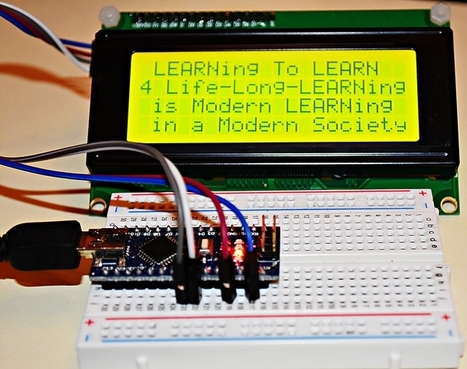
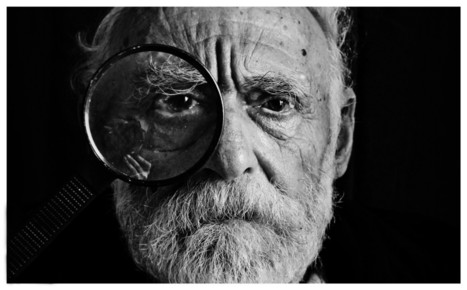


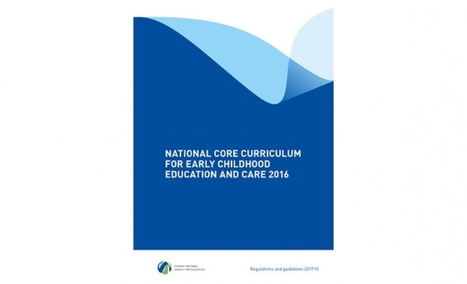


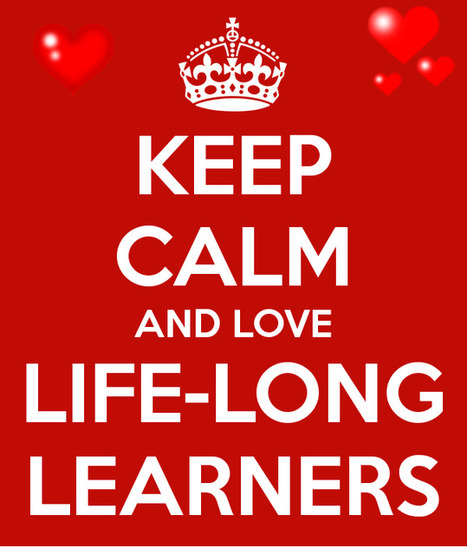


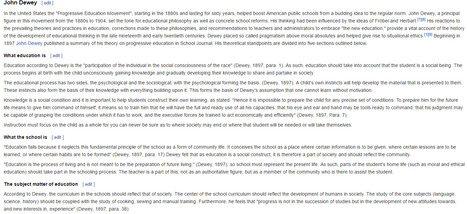
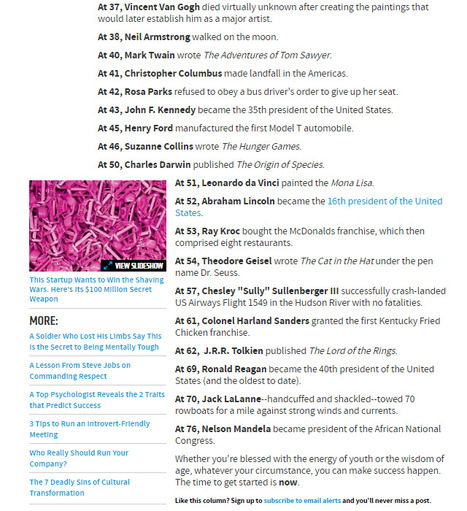
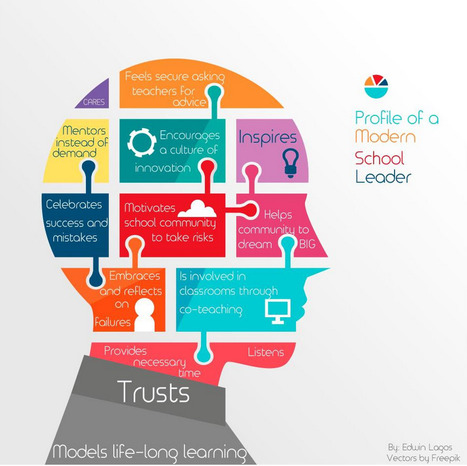

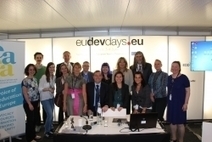

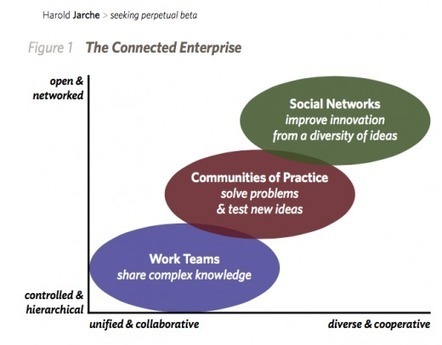
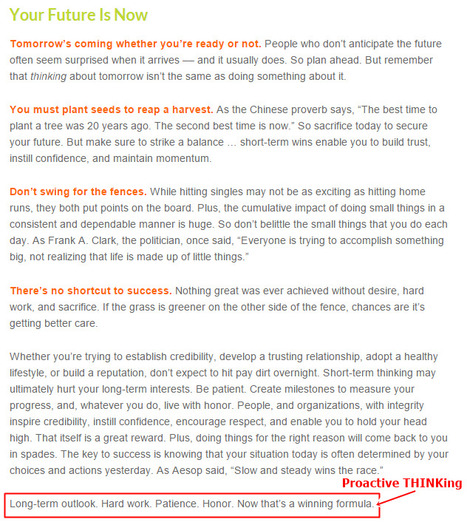

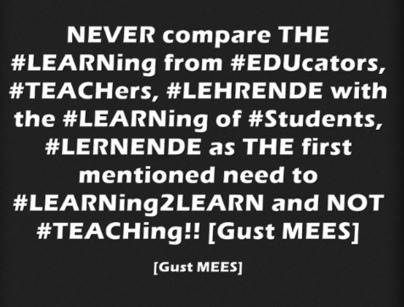
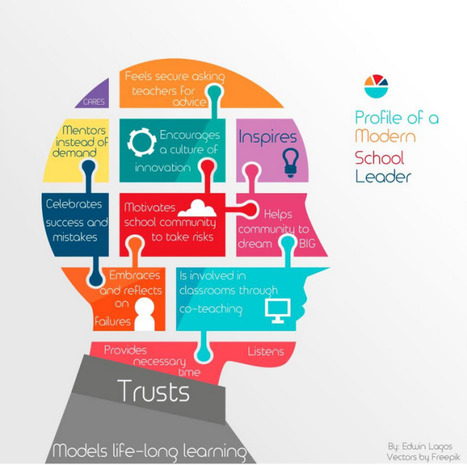
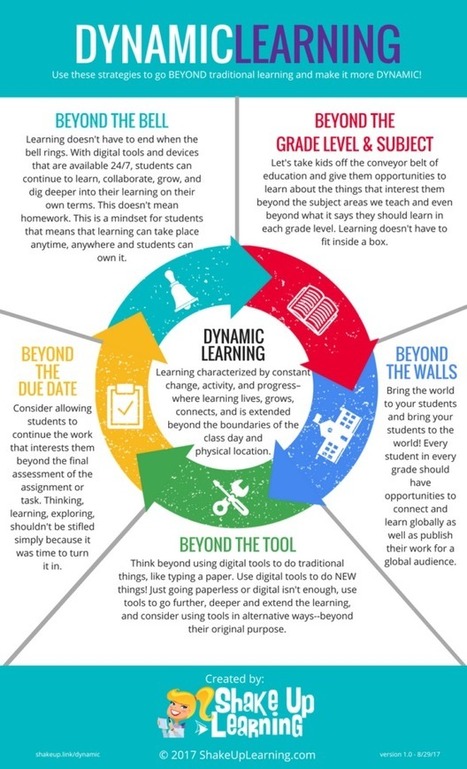


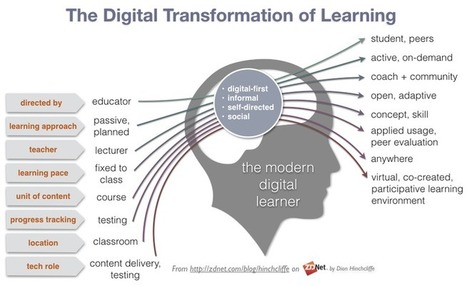

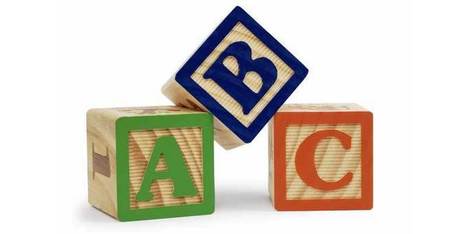
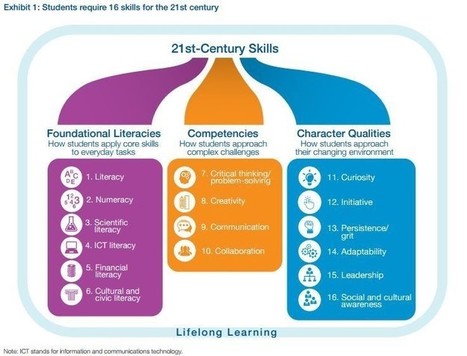






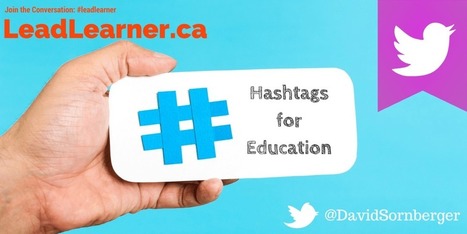

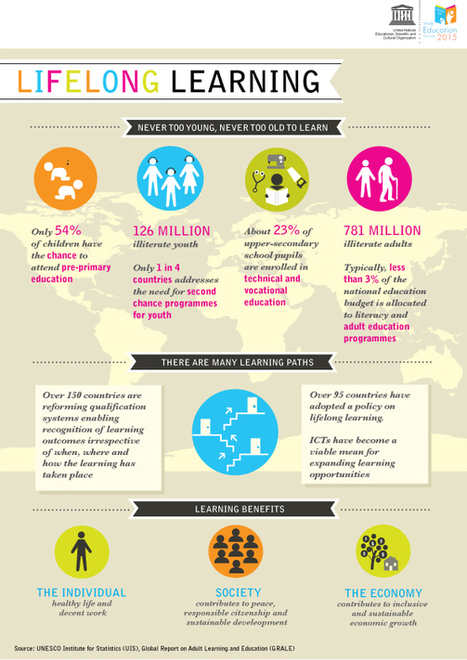







The World Economic Forum shared the Future of Jobs report in 2018 that provided a list of the growing skills for 2022. Here are the top 10:
- Analytical thinking and innovation
- Active learning and learning strategies
- Creativity, originality, and initiative
- Technology design and programming
- Critical thinking and analysis
- Complex problem-solving
- Leadership and social influence
- Emotional intelligence
- Reasoning, problem-solving, and ideation
- Systems analysis and evaluation
If we look at these 10 skill areas, what types of learning experiences or learning spaces can we create for our students that can address most if not all of them? Looking at these skills individually and thinking about the nature of our work, it can seem overwhelming. However, there are some simple ways to create a space where students can build all of these skills and more.
Here are six ideas to try that can help to address these skills:
1. Project-based Learning (PBL)
2. Coding
3. STEAM and Makerspaces
4. Place-based
5. Genius Hour
6. Student-Led PD or Teacher for a Day
Learn more / En savoir plus / Mehr erfahren:
https://www.scoop.it/t/21st-century-learning-and-teaching/?&tag=Grit
https://www.scoop.it/t/21st-century-learning-and-teaching/?&tag=Growth+Mindset
https://gustmees.wordpress.com/2015/05/13/andragogy-adult-teaching-how-to-teach-ict/
https://gustmees.wordpress.com/2017/08/25/adventures-of-learning-how-does-it-happen/
https://gustmees.wordpress.com/?s=life+long+learning